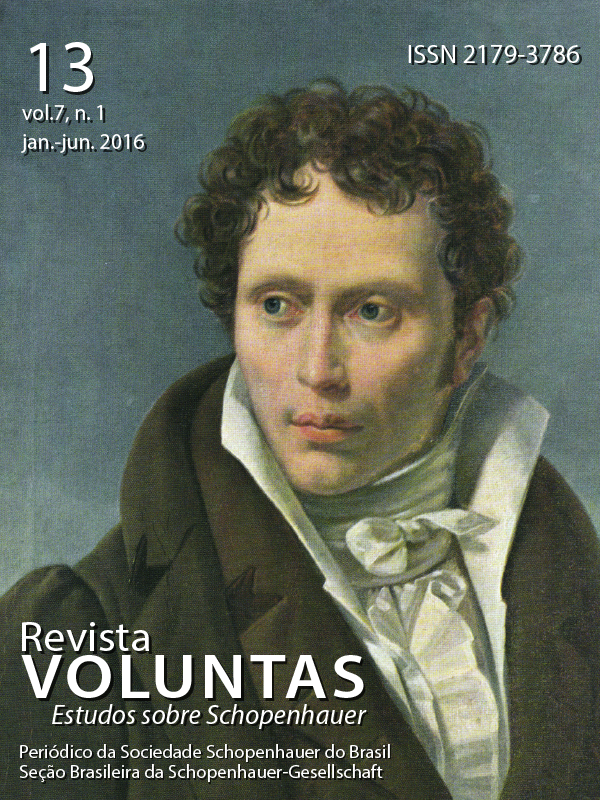Between the "characterology" of Schopenhauer and the "become what one is" of Nietzsche
DOI:
https://doi.org/10.5902/2179378633750Keywords:
Schopenhauer, Nietzsche, Character, Subject, Become what one isAbstract
This publication concerns to the unfolding of a study on the theme of the subject. Its focus is on the ambivalence of some aspects of the thema, such as a subject understood as the result of a subjectivation process, firstly, and, secondly, as an agente which acts on this process in order to direct it. The goal at this point is to show that this kind of ambivalence, common in recent writings of Nietzsche, is not accidental, but corresponds to a particular way of doing philosophy that can be summarized under the term "margin of maneuver", which corresponds to a procedure known by him in his reading of Schopenhauer. In order to illustrate this procedure, we will point out the ambivalence checked in characterology Schopenhauer, especially in the way he extends the concept of character, in view of sections 28 and 55 of The World as Will and Representation, and in Nietzsche, we will indicate the ambivalence present in the idea of a self understood in Ecce homo. As we intend to demonstrate this way of doing philosophy is indispensable for a conception of the subject that can be identified in Schopenhauer and that is amplified by Nietzsche.Downloads
References
ANGIONI, Lucas. Aristóteles e a noção de sujeito de predicação (Segundos Analíticos I 22, 83a 1-14). In: Philósophos – Revista de Filosofia, v. 12, n. 02, 2007. Disponível em: http://revistas.ufg.br/index.php/philosophos/article/view/6266#.VO9vlS5WXlc), consultado em outubro de 2015.
DEBONA, Vilmar. Um caráter abissal - a metafísica schopenhaueriana da Vontade como caracterologia. Revista Voluntas: Estudos sobre Schopenhauer. Rio de Janeiro, Vol. 4, Nº 1, 1º semestre de 2013, pp. 33-65.
DESCARTES, René. Discurso do método. São Paulo: Abril Cultural, 1991 (Col. Os Pensadores).
FIGL, Johann. Dialektik der Gewalt. Düsseldorf: Patmos, 1984.
GIACOIA JR., OSWALDO. Nietzsche x Kant. São Paulo: Casa da Palavra, 2012.
KANT, Immanuel. Crítica da razão pura. 6ª ed. Lisboa: Calouste Gulbenkian, 2008.
MARTÍNEZ, R. Sanchiño. “Aufzeichnungen eines Vielfachen”. Zur Friedrich Nietzsches Poetologie des Selbst. Bielefeld: Transcript Verlag, 2013.
PASCHOAL, Antonio E. Nietzsche e o ressentimento. São Paulo: Humanitas, 2014a.
PASCHOAL, Antonio E. Genealogia, crítica e valores. Uma correlação entre fins e meios. Revista Sofia. Vitória, vol. 3, n. 2, Julho/Dezembro de 2014b.
PEREZ. Daniel Omar. A relação entre a Teoria do Juízo e a natureza humana em Kant. Educação e Filosofia (EFU. Impresso), v. 27, p. 233-258, 2013.
PLAICE, Renata. Spielformen der Literatur: der moderne und der postmoderne Begriff des Spiels in den Werken von Thomas Bernhard, Heiner Müller und Botho Strauss. Würzburg: Königshausen & Neumann, 2010.
SCHOPENHAUER, A. O mundo como vontade e como representação. Tomo I. Trad. Jair Barboza. São Paulo: UNESP, 2005
SCHOPENHAUER, A. O mundo como vontade e representação. Tomo II. Trad. Eduardo Ribeiro da Fonseca. Curitiba: Editora da UFPR, 2014.
SCHOPENHAUER, Arthur. O livre-arbítrio. Trad. de Lohengrin de Oliveira. Rio de Janeiro: Nova Fronteira, 2012.
SCHOPENHAUER, A. Kleinere Schriften. Ueber die vierfache Wurzel des Satzes vom zureichenden Grunde. Zürich: Haffmans Verlag, 1988, p. 7-167.
SCHOPENHAUER, A. Kleinere Schriften. Preisschrift über die Freiheit des Willens. Zürich: Haffmans Verlag, 1988, p. 359-445.
SCHOPENHAUER, A. Die Welt als Wille und Vorstellung. I. Haffmans Verlag, 1988.
SCHOPENHAUER, A. Die Welt als Wille und Vorstellung. II. Haffmans Verlag, 1988.
SOMMER, Andreas Urs. Friedrich Nietzsches “Der Antichrist”. Basel: Schwabe & Co. Ag. Verlag, 2000.
STEGMAIER, Werner. As linhas fundamentais do pensamento de Nietzsche. Petrópolis: Vozes, 2013.
VIESENTEINER, Jorge L; GARCIA, André L.; Apresentação. In: STEGMAIER, Werner. As linhas fundamentais do pensamento de Nietzsche. Petrópolis: Vozes, 2013, p. 11-19.
Downloads
Published
How to Cite
Issue
Section
License
The submission of original manuscripts to this journal implies the transference, by the authors, of the copyrights for printed and digital publication. The copyrights of a published manuscript belong ultimately to the author, and only the copyright for its first publication is reserved to the journal. Authors may only use the same results in other publications explicitly indicating this journal as the medium of the original publication.
Licence
Attribution-NonCommercial-ShareAlike 4.0 International (CC BY-NC-SA 4.0) - This license lets others remix, tweak, and build upon your work non-commercially, as long as they credit you and license their new creations under the identical terms.






